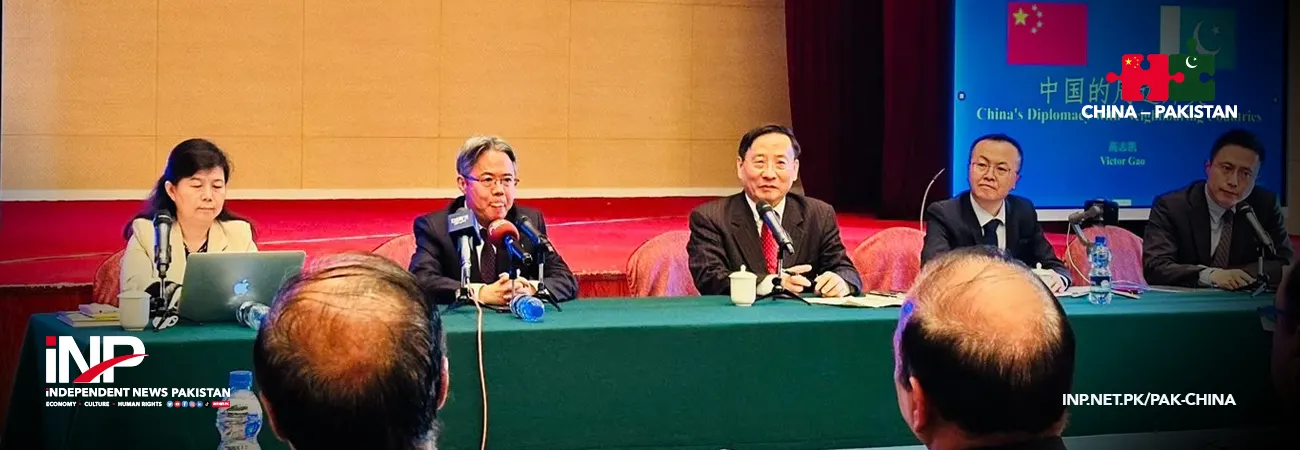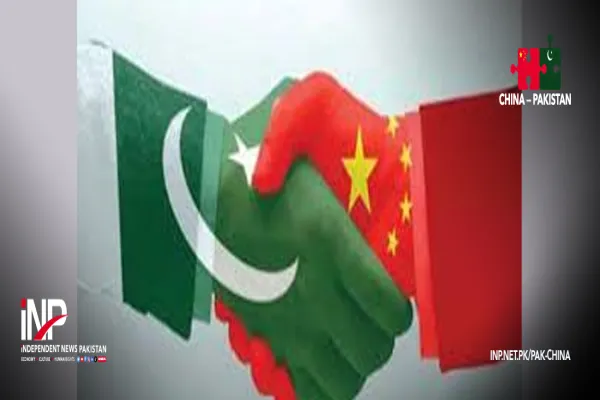i NEWS PAK-CHINA
A leading Chinese scholar Zhikai Gao said that growing Sino-Pak brotherhood is a reflection of Chinese diplomacy that's brings peace and development Worldwide under leadership of Xi Jinping. As a key-note speaker at a select gathering of journalists and members of Think-Tank here on Monday at the Chinese Embassy, he reiterated that his country will continue to give unconditional support to Pakistan for its development and improving the livelihood of its people. Chinese Ambassador Jiang Zaidong in his opening remarks on the occasion highlighted Chinese policy of brotherhood, particularly in context of BRI and CPEC. The event was arranged in the framework of the “Dosti Park Club" with Theme: Chinese modernization and diplomacy.
Zhikai Gao was accompanied by Ying Liu, research fellow of RDCY, and Tianshu Liu, the executive director of Cuihu International Research Institute. He elaborated various topics such as the “Belt and Road” Initiative, China's principle of amity, sincerity, mutual benefit and inclusiveness in neighborhood diplomacy, Chinese modernization. It was followed by a Q&A session. It was pointed out that in October 2013, President Xi Jinping, who is also general secretary of the Communist Party of China Central Committee, put forward the principle of "amity, sincerity, mutual benefit and inclusiveness" for China's neighborhood policy at a meeting on neighborhood diplomacy, the first such meeting to be held since the founding of the People's Republic of China. Over the past decade, this vision has served as a major guideline for the promotion and implementation of strategic initiatives such as the Belt and Road Initiative, and the building of a community with a shared future in the neighborhood, which has contributed to a better neighborhood environment for China and greater stability and prosperity for the region.
In the face of profound global changes unseen in a century, the vision, together with the implementation experience, remains relevant for regional peace, stability, development and prosperity. First, the principle of "amity, sincerity, mutual benefit and inclusiveness" is a conceptual innovation based on decades of China's neighborhood diplomacy. The neighborhood is where China anchors to survive and thrive. The neighborhood is therefore always on top of China's diplomatic agenda. Way back in 2013, President Xi stressed that the basic principle of China's neighborhood diplomacy is to pursue friendship and partnership with our neighbors, help build an amicable, secure and prosperous neighborhood, and follow a neighborhood policy featuring amity, sincerity, mutual benefit and inclusiveness. Since the founding of the People's Republic of China, successive central leaderships have attached great importance to neighborhood diplomacy and put forward a series of strategic visions and policies.
Developing amicable and friendly relations with neighboring countries has always been high on China's diplomatic agenda. Such policies were mainly practiced on the bilateral level before the mid-1980s, and began to gain in weight since the launch of reform and opening-up, when concepts like "close neighbor", "neighboring country" and "neighbors facing each other across the sea" appeared increasingly in China's diplomatic discourse. Chinese Ambassador in his address further said the construction of CPEC was being carried out in order to share the Chinese modernization with Pakistan for achieving its development targets.
Enhancing livelihood of the people is another focus in implementing CPEC. In this connection, he referred to the ongoing development projects in the fields of energy, highways development, agriculture and social welfare sector. The Chinese Scholar in his address also spoke about China-USA relations and said peace and working on equal basis is imperative for both of them. He said war and confrontation between them are not workable. He hoped the scheduled meeting of President Xi Jinping with his American counterpart will be productive for pushing forward the Chinese policy of brotherhood.
Credit: Independent News Pakistan (INP) — Pak-China









